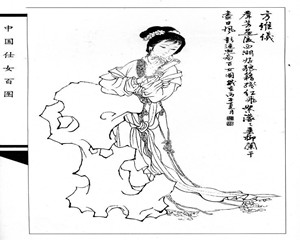方维仪(1585—1668),字仲贤,安徽桐城人(今桐城市区凤仪里人)。明末著名女诗人、画家,所作有《清芬阁集》, 又辑历代妇女作品为《宫闺诗史》。其绘画师法宋代李公麟,尤擅长绘释道人物。特别是白描《观音大士图》形神兼备,许多人争相收藏。

方维仪·《死别离》
昔闻生别离,不言死别离。
无论生与死,我独身当之。
北风吹枯桑,日夜为我悲。
上视沧浪天,下无黄口儿。
人生不如死,父母泣相持。
黄鸟各东西,秋草亦参差。
予生何所为,死亦何所辞。
白日有如此,我心徒自知。
Parted by Death
Fang Weiyi
Since times of old we hear of separation;
Who has spoken of partings by death?
Yet whether it be by life or by death
I face it all alone.
The north wind buffets the barren mulberry,
It mourns for me night and day.
I lift my eyes to the broad azure sky
Below, no wide-mouthed babe.1
To live thus is worse than death,
Still, mother and father cling and weep.
Two orioles fly one east, one west,
The autumn grasses, too, are in disarray.
I live and what do I serve?
I die why should I refuse?
That under the white sun there can be such torment,
My heart knows well, in vain.
1. She raises her eyes to heaven in supplication, like the speaker of poem 65 in the Book of Odes. The expression huang kou er describes a fledgling chick or a baby. This couplet alludes grimly to the yuefu poem "Leaving from the Eastern Gate" ("Chu dongmen xing"), in which a wife pleads with her husband not to depart: "Other families only care for wealth and fortune, /Your humble wife would simply share the plainest gruel/For the sake of the bounty of blue heaven above/And our wide-mouthed babes below."
(Paula Varsano 译)
更多精品翻译素材,敬请关注可可英语。












